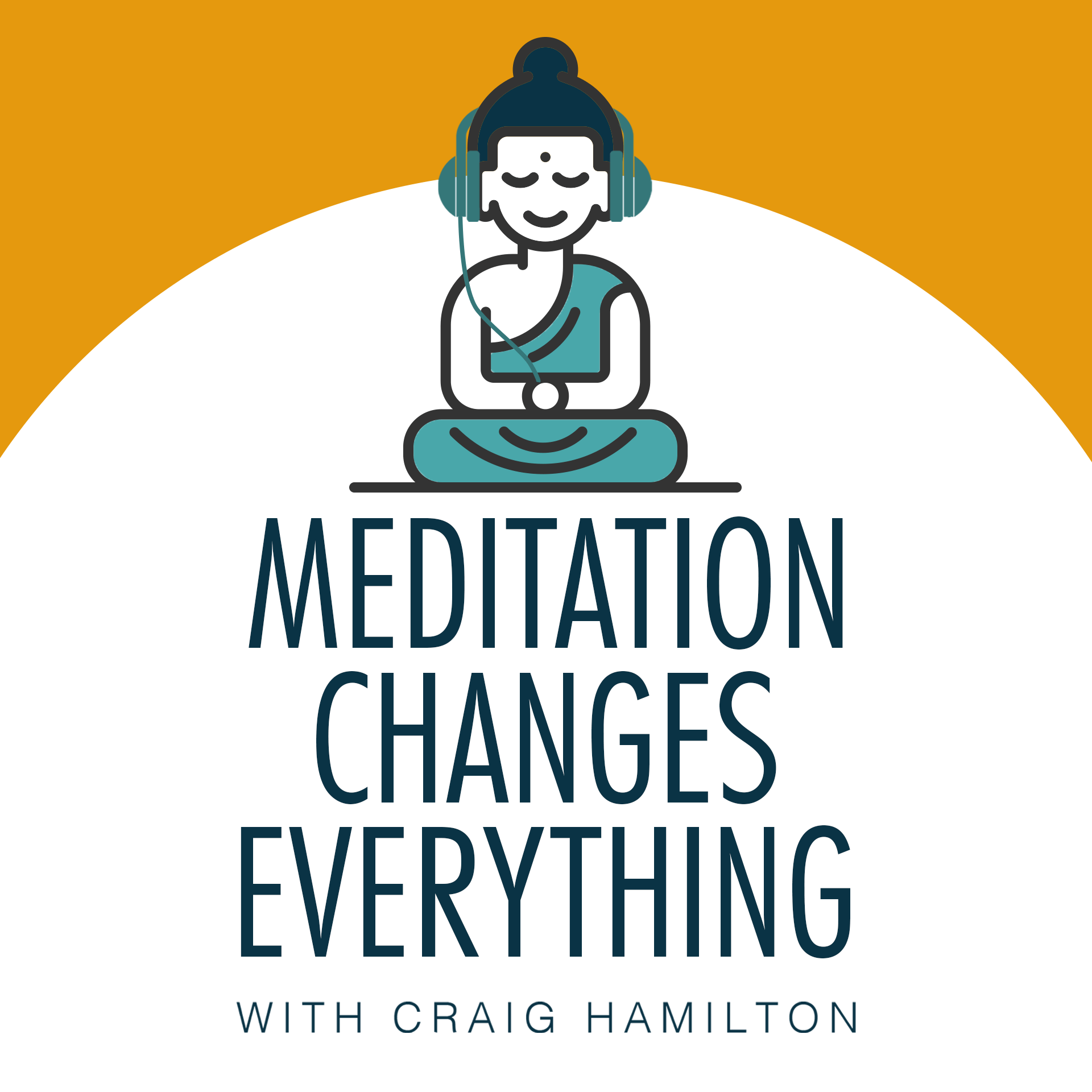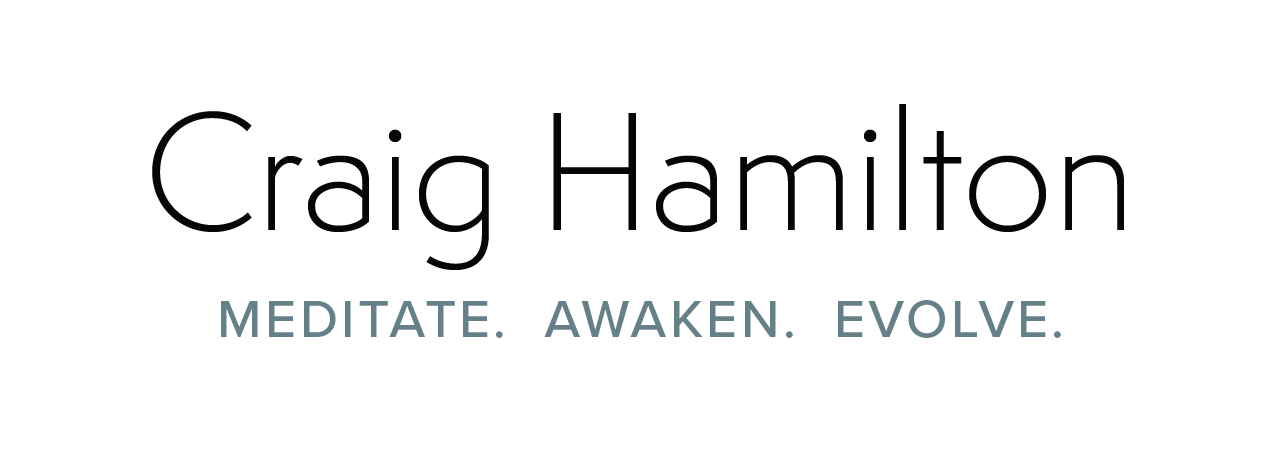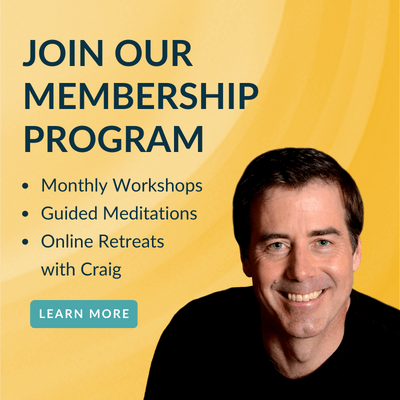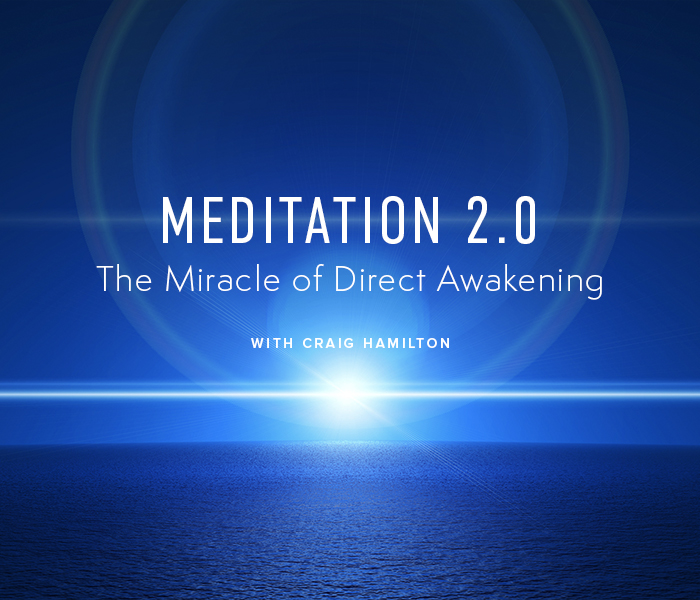In This Episode…
“Anybody who aspires to awaken to their true nature must be willing to let go of everything that provides them with security, certainty, and familiarity. It doesn’t mean it all goes away. We just have to let it go. We have to let go of our grasping onto anything at all. And that requires a passionate drive to awaken. We have to really want it.” —Craig Hamilton
Often when we approach meditation, we receive the instructions, sit down, and try to put them into practice. But for most of us, it’s not enough to merely follow the instructions. There’s a step we have to take before any of that if we want to reap the transformative fruits of our practice.
We need to create a rock-solid foundation for our practice. And when we do, it can make all the difference.
In Part One of this series, Craig focuses on two foundations that can empower and fuel your practice: motivation and intention. When our motivation to practice is paired with a strong intention, it can light a fire within us, providing fuel and passion for our growth and development.
Craig also explores how to get out from under the critical voice in our head—the one that often dominates and dampens our meditation. This helps us cultivate the playful, experimental, and curious spirit we need to nurture for our practice to deepen and thrive.
If you’re interested in exploring more of Craig’s approach to meditation, you’re invited to tune in to a 90-minute online workshop Craig will be hosting called Meditation 2.0 – The Miracle of Direct Awakening. Register for free at FreeMeditationWorkshop.com
EPISODE TRANSCRIPT
Episode 10 Foundations of Meditation – Part One: Motivation, Intention, and Nonjudgment
The first foundational practice that I want to speak a little bit about is motivation for awakening, which is also tied to our intention. Intention is sort of a crystallized motivation. An intention emerges as you tap into a deeper motivation and then solidify it. You kind of anchor to it, is maybe a way I would talk about it.
From one point of view, the power of our practice is partly rooted in how precisely and accurately we do the practice because the precision of our practice is critical. The difference between really not knowing and almost not knowing is like the distance from here to the sun. It’s vast, the gap between those two, and that would be true for any of these practices.
Exploring Motivation & Intention
The precision is important, but just as important is the motivation and intention that we bring to the practice. Even though awakening is very accessible because it’s awakening to who we already are, it also requires a great leap into the unknown.
It is a break in the momentum of our entire life, and not just our life but the collective life that humanity shares. Anybody who aspires to wake up, to discover awakened consciousness, to awaken to our true nature beyond the false self-structure, has to be willing to let go of everything that has provided us with security, certainty, and familiarity up until now.
It doesn’t mean it all goes away but we have to let go of it all. We have to deeply, fundamentally let go of our holding on to anything, and that requires a passionate drive to awaken. We have to really want it.
Cultivating A Powerful Desire For Awakening
The Indian sage Ramana Maharshi was famously quoted for saying, “You have to want self-realization like a drowning person wants air.” You have to want it that much. You’ve got to get to the surface to get the air. There has to be this intense drive in there.
Additionally, just looking at meditation, what’s one of the things meditators struggle with most? Distraction and focus.
How do I stay focused on the practice? I find I drift off to sleep or my monkey mind is going on and I can’t focus, I get distracted. But one of the most powerful ways to bring focus to our meditation is to cultivate a powerful motivation or intention.
If you were walking on a tightrope, what are the chances that your attention would drift off of that balancing act onto “Hmm, I wonder what I’m going to have for dinner later after I get to the other side of this 2,000-foot deep chasm?” It’s not very likely that you would be thinking about dinner. You’re probably going to be 100% focused on that tightrope.
Why?
Because if you lose focus you might die, and that burning drive to stay perfectly balanced and poised is going to keep you completely focused on walking across. What would it mean to have that level of intense focus for our practice? After all, we’re not doing huge amounts of practice here. We’re not saying you have to stay focused like you’re on the tightrope for 12 hours straight. We’re doing short bursts of intense practice. What would it be to have that kind of motivation? That’s what we’re really pointing to.
How To Deepen and Strengthen Your Motivation & Intention
The good news about motivation and intention is that it’s something we can cultivate. We can deepen and strengthen that. It has a number of components to it, and I’m going to go through some of them. If you have a writing journal, or something to write on and with, as I go through it just jot down what stands out for you in this contemplation.
The other thing I want to say by way of context is that motivational and intentional practices are something that you can do as their own standalone contemplation, but they’re also something that’s very powerful to do briefly at the beginning of each meditation practice. You can put more time into it; you can do it briefly. There are different ways to approach it, but this can help you focus your practice as well as being something you can do on its own.
1. Connecting To Your Own Experience Of Awakening
There are a few different dimensions to what we might call enlightened motivation or intention. One of them has to do with getting more related to the significance of spiritual awakening. Getting more in touch with why this really matters and what it can make possible.
It can be inspirational in the sense of getting really connected in your own experience to the higher potential that you’ve glimpsed or tasted for your own life, to whatever degree. Maybe this happens through a brief experience, maybe through a plateau experience, or maybe just through an inkling, but really sensing into what awakening could make possible.
2. Connecting To Your Own Highest Potential
There can also be a realization about what it can make possible for you personally. You realize that the potential is there to break free from the prison of the false self, from the momentum of unconscious habit, from the ways I still react that I wish I didn’t.
You start to realize that the potential exists to be this superconscious being–to discover your supernature and become a human being who’s the embodiment of higher virtues and higher capacities and able to really be a gift to the world. Maybe we sense that and we say, “Oh, I could become that. I could realize that and bring that to this world, and what an extraordinary life that would be.”
3. Connecting To A Precious Opportunity
There’s a dimension of this that is also about reflecting on the precious opportunity we have compared to other people. Think about all the people in the world right now who don’t have this kind of opportunity to awaken. They’re not even going to have in their lifetime the opportunity to hear about awakening, to know about a potential for a higher spiritual illumination. They’re going to spend their entire lives struggling with survival.
Think of all the people living in war-torn areas, refugee camps, losing loved ones on a regular basis. The horror and the pain and the tragedy that plagues so much of this world – people who live in forced labor slavery, sexual slavery, the millions who currently live in those conditions, people who live in poverty, or even just people who live in deep culturally-embedded ignorance, narrowness, or who don’t have opportunities for education, even very basic education.
We are so lucky to have the opportunity to be a person who’s got the freedom to think about and put time into meditation for the potential of spiritual illumination. It’s a very rare thing still on this planet for all kinds of reasons, even though there are obviously millions of us interested in it. We’re still a tiny fraction, and so many will never become interested.
What happens when we reflect on that and we allow ourselves to feel ennobled by the opportunity we have to be people who can pursue something like this and help evolve the leading edge of consciousness on this planet, help humanity awaken to its true nature and reveal it to the world.
4. Connecting To The Grandeur of the Evolutionary Impulse
There’s an evolutionary significance to this that, when we contemplate it, we might not get it right away, but the more we reflect on it the more we can start to see it. It has significance for humanity, for life, for consciousness itself.
There are dimensions of awakening where it just reveals the reality of the sacred or the divine. When that becomes manifest, when it is embodied by human beings, it has a kind of spiritual significance that’s even beyond the impact on the world and on people. It’s like the great project of spirit evolving, consciousness evolving. These are also things we can tap into.
There are very practical ways we can look at the impact of continuing to live in unconsciousness, in the momentum of habit and the impact that has on us and the people around us. Often we look and say, “Oh, I wish I didn’t do those things because I see the ways it impacts other people, the way it impacts my life.” We have a hard time breaking the momentum, breaking the habits.
The potential to be spiritually free in this life for all those reasons and other deep reasons that we might connect to—it includes a lot of these dimensions.
Taking time at the beginning of your practice to just briefly reflect and connect with some of the deeper terrain there that resonates for you, that’s what I’m talking about. Maybe for right now just take one minute, for those of you who have a pen, to just write down any of what’s true for you, what’s resonant for you.
Leaving The Inner Critic At The Door
What I now want to talk about briefly is how to establish a non-critical, problem-free orientation to your practice and invite you to remind yourself before each practice session what it means to leave our inner critic out of our practice; to leave it on the steps of the temple when we come into our meditation temple.
This is a big thing because we live in an age when self-judgment and self-criticism is very strong. It’s one of the psychological maladies of our time. And without going into a lot of the reasons why, I think it’s one of the byproducts of the subtle narcissism and self-focus that really plagues most of us today. Our culture has placed so much attention on the self and gotten us to place so much attention on ourselves—an unprecedented amount of attention on the self compared to any other time in human history.
We are very focused on our own happiness, on our own fulfillment, performance, success, actualization, self-enlightenment, and this birth of the empowered self. The actualizing self has been a powerful movement in consciousness.
But there’s a byproduct of it—we’ve become so used to paying so much attention to ourselves and our inner world that when we sit down to meditate and there’s this question, “well, am I doing it right? Is this it? Oh, I think I blew it. I’m not doing it right.” There’s this inner narrative that, for many of us, is going on.
We all have it to different degrees. Some of us have very intense self-criticism that plagues us throughout our lives. Others of us have already done a lot of work on letting go of that, but you notice when you sit down to meditate, you start doing it, and there’s this part of us that’s measuring our progress, telling us whether we’re doing it right or not, or so we think.
It was an interesting decision for me to add this as a foundation. It’s a particular thing, I think, in our time to really bring this forth. And because of the nature of direct awakening practice, I want us all to make this a part of our practice foundation. By practice foundation I mean what we are grounding our practice in every time we do it, to really make it a problem-free zone. So, in your imaginary virtual temple there’s a sign on the door that says, “Leave the critic at the door with your sandals. No problems allowed in the meditation hall.”
You Can’t Measure Your Meditation
One of the truths I want us to anchor in to help establish this criticism-free foundation for our practice is the truth that you don’t know whether you’re doing it right and you can’t know whether you’re doing it right. You can’t. These are subtle practices.
Your ego can’t do direct awakening practices. These practices are utterly beyond its capacity to do. The only part of the self that can do these practices is your awakened self, it’s your true nature. These practice injunctions are invitations for your awakened self to show up and do the practice. That’s really what they are. They inherently go beyond the mind’s ability to grasp even what’s happening.
You cannot measure the quality of your practice based on what you’re experiencing during the practice session. You can’t. So let go of trying. That’s the first invitation.
Meditation Isn’t A Particular Experience
Realize also meditation’s not about having a certain kind of experience during the practice. Awakening is not about a certain experience. Meditation is not about a certain experience.
During meditation, positive experiences come and then they go away; unpleasant experiences come and go away. That doesn’t mean you did anything. You didn’t cause that, and even if you did, it doesn’t mean the good feelings were the meditation and the bad feelings weren’t.
The whole ever-changing landscape of the human experience is going to move through you in meditation. You can’t use any of it as a sign of how well you’re doing with the practice. Even if you’re struggling in meditation, struggling is not a bad thing, necessarily. It might be. It might not be. You don’t know.
The presence of very intense feelings, or having an active mind, are not signs that you’re doing anything wrong. Sometimes the mind becomes more active. There’s a spiritual quickening, a spiritual activation. Sometimes you start to awaken to your true nature and you get flooded with creative ideas. They just overwhelm you, all the best ideas that anybody has ever thought. It doesn’t mean you’re now distracted. It means you tapped into the evolutionary impulse. You accidentally popped into an oil vein like when they strike oil and it goes spouting up. That happens in spiritual practice. You accidentally puncture into a vein of creativity and it all comes flooding out.
None of these mean you’re not meditating. Meditating is about sticking with the practice injunction and just giving your energy and attention to it consistently no matter what’s arising. So in that, there’s no room for self-measurement and, therefore, no room for self-criticism. Remind yourself of that before you practice.
Meditating For All The Right Reasons
That’s the first part. The second part is, even if you’re having a hard time doing it, you just have to try. Let’s imagine there was some divine consciousness that was watching you and could peer into your meditation and see whether you were doing it right or not: “Look at him, totally identified with thought and blowing it. Oh, wow! Look at her – really letting it all be. Good work. Give them a gold star.” The angels are peering down into your meditation, judging you. Let’s imagine that’s happening.
Even if you were totally blowing it, can you rest in the place of just looking at what you’re doing? You’re a human being in this world and there are a million things you could be doing with your time and energy, things that are pulling at our time and energy.
You’re prioritizing doing the hardest thing a person can do, which is to meditate for a bigger reason, for the purpose of spiritual awakening. You have a very noble heart. You have a powerful intention. You are giving yourself to the great work of awakening and evolving consciousness, of bringing heaven down to earth, of giving birth to a new humanity.
Whatever your larger framework is, that’s what you’re participating in. That alone, even if you really were doing it all wrong, would still be enough reason to be generous and kind to yourself and not critical; to just be like, “okay, I’m just here trying. I’m just here trying. Maybe I’m getting it all wrong. I’m just here trying.”
There’s No Time To Be Self-Critical
The main point here is that to really do these practices, you just have to try. You just have to keep giving it a shot. The way to really orient yourself to the practices as you’re doing them – say you’re taking 30 minutes doing it – is always just in each moment you just keep working at doing it. You just stay with it and you just keep doing it.
Even if you got totally derailed and you’re convinced you got totally derailed. “Oh, look, I started planning my day. I was planning my vacation. What am I doing? I’m supposed to be here meditating and I’ve just been totally distracted for 10 minutes!” Even when that happens, don’t give yourself any room to dwell on it for one second. Just come right back and say, “I’m meditating. I’m going to keep going with the practice. What was I doing? I was letting go. I was going to let go now. And now I’m doing it. I’m letting go. Okay.”
No time to fret or be self-critical or try to figure out how to get more serious about our practice. “I must not have a very deep intention. My motivation must be very small-minded and that’s why I’m distracted.” No time for that during meditation.
If you want to analyze your practice after meditation, that’s okay. Get out your journal and look back, “Huh, what happened in there? Hm.” Be curious. Ask yourself, “what would it take for me to be more determined, more focused, and with more intent?” That’s fine.
Outside the practice you can bring your awareness to reflect, but not in a self-critical, negative way, by any means, but in a learning, constructive way. But during the practice, it’s off limits. All you’re doing is trying. You’re doing it. You just keep trying to do it. You try it in new ways. Try it in a different way than you did a few minutes ago. It’s okay. But you just keep working with it and when you’re done, you’re done. You stop. That’s it.

NEWSLETTER
Follow The Podcast
Subscribe to Craig’s weekly Awakened Life Newsletter to receive his latest inspirational teachings and guided meditations.










